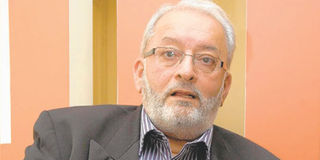CEO for whom customer care comes first in business

Azym Dossa, CEO of EasyCoach. Photo/PAUL LETIWA
Azym Dossa, 62, trained as a public accountant and worked in the UK and Canada between 1968 and 1985.
He is the managing director and CEO of EasyCoach and also among its founder.
EasyCoach is a passenger transport and courier business whose network includes Western, Nyanza and Rift Valley provinces.
Started in December 2003 with just 11 buses and 50 workers, the firm’s founders were motivated by a desire to bring discipline and reliability to public transport.
They introduced vehicles driven and manned by polite, well-experienced personnel who had to be sticklers of the laws of the road.
When the Government finally started implementing traffic rules for public transporters in February 2004, they were already a way of life for the firm.
The company runs a fleet of over 80 modern-style buses today and indeed it has been a short but rewarding journey for the business that started with just a single route — Nairobi-Kisumu-Kakamega.
Mr Dossa talks to us about his journey in making money.
Why did you invest in the transport sector given the risks?
A: I worked in a senior position for bus company for 17 years and gained enormous experience, so my entry did not come as a surprise to those who know me. I had done enough homework and I had a pretty good idea how I wanted to position my business in the market.
EasyCoach has been able to distinguish itself as a stickler for traffic rules in a chaotic industry, how?
A: By adhering to the traffic code, which comes with benefits. You cannot afford run-ins with law enforcement agencies. One must also be able to stick to their promise and mandate.
What ails the public transport sector?
A: Some players who give the PSV sector a bad name are in it for the money. There is lawlessness and greed. Some of these people have given the ‘Michuki rules’ a wide berth and are putting the lives of passengers at risk. I am glad TLB is doing something about it at last.
Would you describe your business as profitable and successful?
A: Every businessman must engage in an economic enterprise that generates some profit. If success is about growth, consistency, good customer care, ability to adhere to traffic rules and deliver on our promise, then my answer is in the affirmative.
What are some of the challenges?
A: Licensing. The central government issued a gazette notice centralising acquisition of business licenses, yet all municipal, county and town councils disregard the directive and continue to levy all manner of taxes.
The government must protect tax-paying organisations. It pains me to pay double taxes while holding a government document that is only good on paper.
We have over-politicised our institutions but I believe the new constitution has adequately addressed some of these issues.
Has TLB and the police done enough to streamline the sector?
A: TLB must be commended for introducing the so called “Michuki rules” and spearheading reforms in the sector. The police, especially the traffic department, has risen to the occasion but there still exist players who have no respect for the rules and continue to flout them with impunity.
The recent return of Hassan ole Kamwaro, the no nonsense TLB chairman is good news. He has the boldness to streamline the sector.
What is the cost of doing business in Kenya?
A: Other than normal operating costs, we have to contend with unanticipated expenditure vis-à-vis extra security arrangements, new employment regulations, unwarranted parking fees, ETR equipment, environmental compliance through NEMA and generators to supplement poor power supply. Demands by copyright society to levy fees on music played to passengers is one other area that is problematic.
What is your best money and investment decision?
A: Setting up EasyCoach. I have worked tirelessly to create an organisation that has opened new frontiers and set standards worth emulating.
What is your worst money and investment decision?
A: Making speculative investments on a number of business opportunities that went awry. It is always important to do a feasibility study before putting in money, otherwise you end up the loser
What lessons has money taught you?
A: Modesty and prudent planning. If we tame our covetous appetites for money and live within our means, everything else will fall in place.
What advice would you give to anyone aspiring to do business?
A: Hard work, perseverance and a shared vision with your public is a sure way to success. No matter how small or big your business is, the ability to understand the needs and expectations of those you interact with in your sphere of business is critical to your own survival.
You must live and relive your vision. Pleasing your customers and employees is the secret to success.




